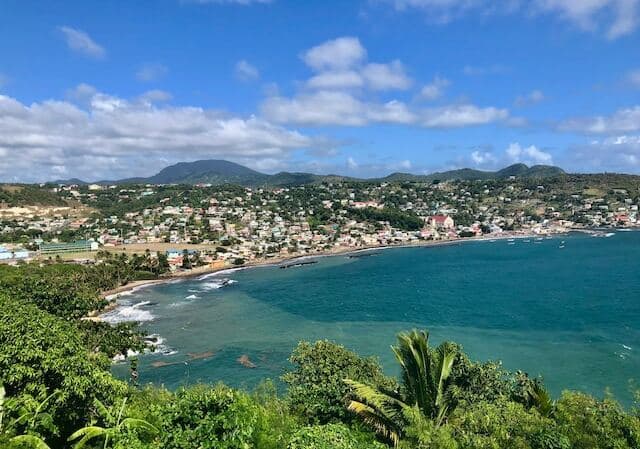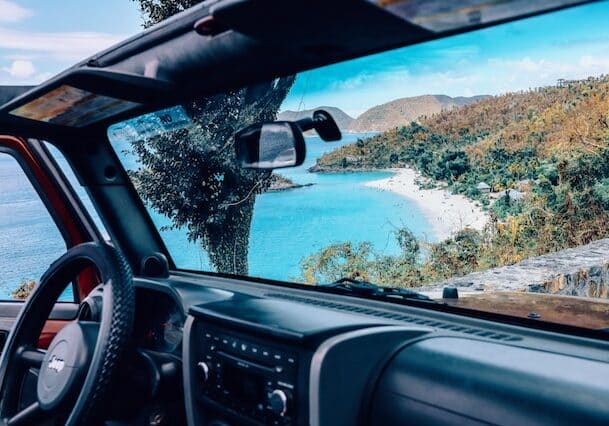While the Caribbean’s uniqueness stems from the white sandy beaches littered across its 7,000 islands, warm temperatures year-round, and relaxing island vibes, safety remains a top priority for its visitors. Safety standards and measures will vary from densely populated nations with over ten million residents to microstates and island territories with populations in the tens of thousands. For visitors and expats contemplating, ‘Is St Lucia safe?‘ this article provides valuable insights into safety in St Lucia.
St Lucia Safety Overview

Saint Lucians are known for their friendliness. Despite the odd occurrence of petty crime, the island’s citizens often greet visitors and foreign nationals living in St Lucia warmly and respectfully, offering helpful advice and insider tips when approached.
In the Eastern Caribbean, Saint Lucia faces harsh weather during hurricane season from June to November, as evidenced by the recent effects of Hurricane Beryl in June 2024. Tourists visiting Saint Lucia and those already in the country should monitor local weather updates as well as have sufficient travel insurance for emergencies.
The United States Department of State considers St Lucia extremely safe for US citizens to travel to, but there are some facts to keep in mind:
Crime: US citizens are not typical targets of crime, but there are occasional instances of murder, armed robbery, and sexual assault. Petty crimes, like pickpocketing and bag snatching, may occur in crowded areas or festivals like the St Lucia Carnival.
Key safety information
Safety precautions:
- Stay in a secure, well-reviewed accommodation
- Be observant when walking alone off main roads
- Avoid isolated areas, especially after dark
- Only use licensed taxis
- Leave large amounts of cash or valuables in a hotel safe
- Conceal the keypad of the ATM when withdrawing cash
- Use ATMs in secure areas like a bank or well-lit public areas like a shopping center
- Check for unauthorized transactions on your bank account statement
- Be aware of distractions in crowded public places
Water sports: Assess the risks of water activities and use qualified tour companies when partaking in water sports.
Firearms: Travelers cannot enter St Lucia with firearms or ammunition without government consent and the necessary documentation.
Domestic violence: American victims of domestic violence can contact the US Embassy in Bridgetown, Barbados, at (246) 227-4000.
Reporting crimes: Report crimes to the local police on 911 and contact the US Embassy in Bridgetown, Barbados, at (246) 227-4000.
Caribbean Islands Crime and Safety Comparison
Numbeo’s Crime and Safety Indexes assess crime rates and safety. A high crime index figure indicates elevated and serious crime, and a high safety index reflects a safer environment.
Country | Crime Index | Safety Index |
St Lucia | 60.92 | 39.08 |
Puerto Rico | 61.88 | 38.12 |
The Bahamas | 56.90 | 43.10 |
Belize | 53.08 | 46.92 |
Dominican Republic | 60.66 | 39.34 |
Jamaica | 67.25 | 32.75 |
Trinidad and Tobago | 70.74 | 29.26 |
Data Source: Numbeo | ||
Are Americans safe in St Lucia?
Current travel advisories from travel.state.gov and cia.gov classify St Lucia as a Caribbean destination for Americans. Travel advisories are categorized into four levels:
- Exercise normal precautions
- Exercise increased caution
- Reconsider travel
- Do not travel
From the current travel advisory level of “exercising normal precautions,” St Lucia is considered a safe Caribbean island for visiting based on investigations of crime rates, health risks, emergency care facilities, and overall safety conditions. American citizens are advised to exercise standard security precautions when visiting the island nation, such as being aware of their surroundings, using licensed taxis, and avoiding risky neighborhoods associated with crime and drug activity.
Visitors should also be aware that public displays of affecting, particularly by same sex couples, may attract unwanted and negative attention, so exercising discretion will help to prevent potential issues.
Driving in St Lucia
Despite being a small Caribbean island, St Lucia offers a public transportation system of minibusses identified by a green number plate with an M prefix. The Saint Lucia Tourism Authority provides detailed information about getting around the Island using public transportation and other modes of transport.
Most foreigners opt for private transfers or local taxes to explore the best things to do in St Lucia. Americans who rent a vehicle from car rental agencies should know that driving in St Lucia is on the left-hand side of the road.
American drivers are advised to familiarize themselves with the behavior or local drivers and road safety laws to prevent accidents and police interactions. Though the St Lucia passport requirements allow entry without a visa for Americans, to drive legally in Saint Lucia, US driver’s license holders need an International Driving Permit (IDP).
There are several risks of driving on a small West Indian island with a mountainous interior, such as wildlife encounters with iguanas and mongoose, as well as stray dogs and cats, narrow or poorly maintained roads—especially in rural areas—and limited lighting while driving after dark.
Car theft is rare in Saint Lucia, but break-ins do happen, particularly in cars with visible belongings. Drivers should park in secure areas and keep car doors locked at all times.
St Lucia Vaccine Considerations

- Polio
- Rabies
- Hepatitis A
- Measles
- Rubella (MMR)
- Tdap (tetanus, diphtheria and pertussis)
St Lucia has been categorized as having a risk of Zika (ZIKV) virus transmission.
Although the yellow fever vaccine is not mandatory when visiting Saint Lucia, tourists arriving from a country with a yellow fever risk within the past six weeks must present a yellow fever vaccination certificate issued at least ten days before arrival.
St Lucia Safety at Night
St Lucia is generally safe for walking at night, but like other countries, travelers must be vigilant at all times, even more so at night. Travelers should avoid walking down streets with poor lighting to minimize the risk of potentially dangerous situations such as violent crime or sexual assault.
Popular cities to visit and retire in St Lucia include Castries, Soufriere, Marigot Bay, and Rodney Bay. These cities are well protected and home to many expats, visiting tourists, and friendly locals, offering a safe experience during night-time activities.
Safety and Security at Events in St Lucia
Known for its lively annual festivals, such as the Saint Lucia Jazz and Arts Festival, the Saint Lucia Carnival, and Creole Heritage Month, the country sees an influx of tourists at specific times of the year. As with any large celebration, visitors should be aware of petty theft and other opportunistic crimes in crowded areas, even in broad daylight.
Event organizers and the local authorities implement enhanced security measures to keep events trouble-free, including increased police presence and crowd control, but remaining vigilant is essential. Tourists should also be cautious of exploitation during festivals and other busy periods, including taxi drivers raising standard taxi fares.
The above safety precautions are even more crucial if you’re traveling solo. If you’re traveling as a group, be sure to have a contingency plan to handle emergencies like lost members and sudden changes in travel plans.
Is St Lucia safe to live in?
As one of the Caribbean’s safest countries, St Lucia is safe to live in and visit. Many Americans choose obtain a St Lucia passport and move to there permanently through the St Lucia citizenship by investment program, which allows foreigners who invest in the economy to obtain citizenship. St Lucia’s safety if further demonstrated in it’s diplomatic relations, with 148 St Lucia passport visa free countries.
Frequently Asked Questions about Safety in St Lucia
How safe is St Lucia for tourists?
St Lucia is one of the safest places to go in the Caribbean. Apart from petty theft and minor drug offences, serious crimes such as sexual assault or armed robbery are uncommon in areas frequented by foreign tourists. Regarding natural disasters, staying up to date with local news reports of incoming hurricanes and storms is essential. Tourists should also keep emergency numbers handy, like police, medical services, and their country’s embassy or consulate.
Is it safe to go off the resort in St Lucia?
Resort guests should feel relatively safe when venturing outside a resort in St Lucia. Most resorts are located in popular tourist areas with a strong police presence.
What to avoid in St Lucia?
Saint Lucia is known for safety, but you avoid things when visiting the island:
- Isolated areas and beaches
- Unlicensed taxi services
- Carrying large sums of cash
- Leaving the resort with travel documents
- Illegal drug use
Camouflage clothing is prohibited in St Lucia, so leave any camouflage items at home. This rule also applies in Grenada, Barbados, and many other Caribbean islands because camouflage clothes resemble armed forces uniforms.
When to avoid St Lucia?
Saint Lucia’s year-round sun and warmth make it suitable to visit any time. Still, between June and November, the region experiences high rainfall, stormy weather, and hurricane risk.
Budget-conscious tourists or travelers should consider visiting St Lucia outside the peak season from mid-June to mid-August and Christmas to avoid higher airfare and hotel prices due to increased visitor numbers.
Can you drink tap water in St Lucia?
Most St Lucians drink tap water, but foreign travelers may opt for bottled or filtered water due to the risk of illness from drinking unfamiliar water. Eating food from street vendors can also be a risk as they may not have the same hygiene standards that tourists are accustomed to.
Is St Lucia LGBT-friendly?
Saint Lucia does not have laws protecting rights based on sexual orientation or gender identity. Furthermore, male same-sex activity is subject to severe penalties, though the law is rarely enforced. Same-sex couples should be cautious when showing affection in public to ensure personal safety and avoid unwanted attention and negative reactions.
Are there risks of using ATMs in St Lucia
Frequent travelers know how common ATM fraud is, particularly in developing nations. Sticking to making withdrawals at ATMs located in St Lucia banks or other secure, well-monitored areas will reduce the risk of ATM fraud. It’s also advisable to use credit cards over debit cards as they offer better fraud protection and minimize the loss of funds if defrauded. Remember not to carry large sums of cash. Carrying small bills of East Caribbean Dollars (XCD) can limit ATM usage.
Is it safe to swim in the sea in St Lucia?
Saint Lucian beaches like Pigeon Island Beach and Reduit Beach in Rodney Bay are highlighted as some of the best in the Caribbean islands due to their white sands and clear and calm waters. Popular beaches among tourists, these beaches are well maintained and monitored by lifeguards who place warning flags to indicate safe and hazardous swimming conditions. Not all beaches in Saint Lucia are safe for swimming, with some being characterized by strong undercurrents and riptides.

 Gizane Campos
Gizane Campos 

